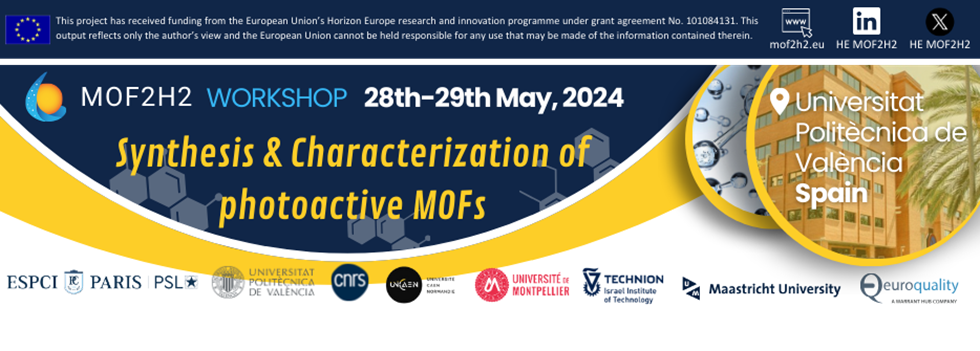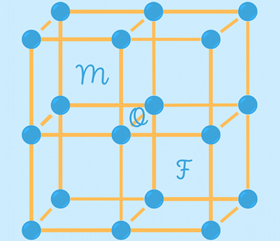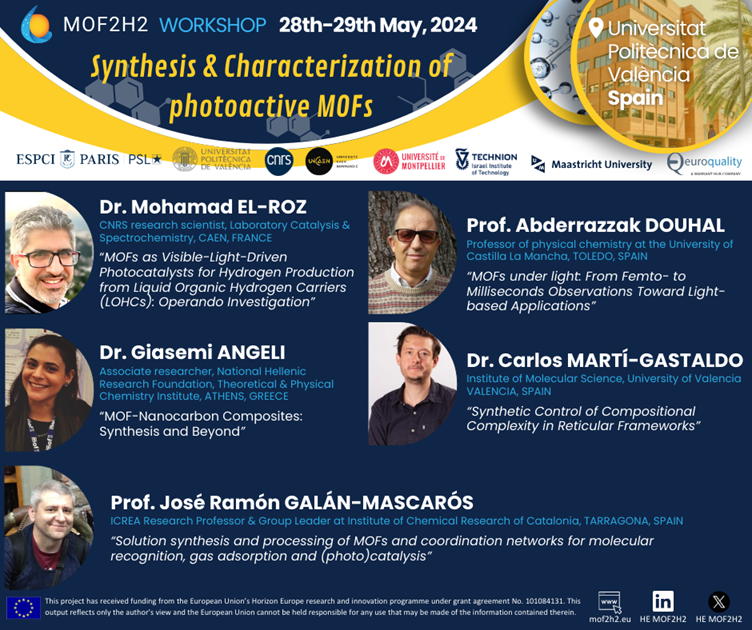
|
Abstract Metal-Organic Frameworks (MOF) are used in a wide range of applications, from gas storage, purification and separation to catalysis and sensing. In the frame of green hydrogen production, these MOFs can be used as efficient and scalable photocatalytic systems for overall water splitting using sunlight irradiation. This workshop aims to gathering the academic material chemistry communities, actively working on the synthesis, characterization and photoactivity of these MOFs. This event is organised by a consortium of international partners as part of the Horizon Project MOF2H2. The MOF2H2 project, standing for “Metal-Organic Frameworks for Hydrogen production by photocatalytic overall water splitting”, aims at developing a new ground-breaking solution to produce Green Hydrogen from sunlight, understanding that low carbon hydrogen is crucial for decarbonizing energy, transport, and carbon-intensive industries. The MOF2H2 project aims to produce it sustainably through photocatalytic water splitting, using non-noble materials as a game-changing solution. This workshop is an opportunity to bring together the scientific community around lectures given by experts and to encourage exchanges within the community in this field. The ambition of this event is to help disseminate the latest research and prospects on MOF materials in sustainable energy applications among researchers, students and the public concerned. This will be an occasion for the research teams, particularly the post-doctoral students, to present their studies and results on the subject through a poster session. This event is hosted by the Chemical Technology Joint Research Institute (Instituto de Tecnologia Quimica, ITQ) at Universitat Politècnica de València (UPV).
Free registration, open until Friday 24/05/2024. You can submit an abstract for the poster session until Friday 24/05/2024. Upload our template from the tab "Abstract template".
INVITED SPEAKERS Dr. Mohamad EL-ROZ Dr. Mohamad El-Roz holds a PhD from the University of Haute-Alsace (2009) and has a rich background in photochemistry and polymer sciences. Since 2014, Dr. El-Roz has been part of the French National Center for Scientific Research (CNRS) and is currently affiliated with the Laboratoire Catalyse et Spectrochimie (LCS) at the University of Caen. His expertise includes in-situ, operando, and time-resolved spectroscopies for materials characterization and photocatalysis. He has led and contributed to numerous high-profile research projects, including significant European Union Horizon 2020 initiatives focused on sustainable energy solutions. Dr. El-Roz's prolific scientific output includes 68 publications in recognized journals, several patents, and book chapters, highlighting his contributions to the field.” Prof. Abderrazzak DOUHAL Abderrazzak Douhal is a full Professor of physical chemistry at the University of Castilla La Mancha (UCLM, Toledo). He has received his M.Sc. and Ph.D. degrees in chemistry from University of Kadi Ayyad (Marrakech) under the supervision of Prof. J.L. Abboud and A.U. Acuña. From 1986 to 1990, he worked at the Institute of Physical Chemistry of CSIC (Madrid). During 1990-92, he was a post-doctoral student at the Institute for Molecular Science (Okazaki, Japan) working in the group of Prof. K. Yoshihara. In 1993, he worked as a researcher associate to Prof. Françoise Lahmani at Laboratoire de Photophysique Moléculaire (University of Paris-Sud/CNRS, France). In 1998, he joined the UCLM as an associate professor, and since 1999 he is a professor of physical chemistry at the same university. He was a visiting researcher at California Institute of Technology in several periods of 1995-2000, working in the group of Prof. Ahmed H. Zewail. Since 1998, he is heading the Femtoscience and Microscopy research group at the UCLM, focusing his research on the study of photoevents in condensed phase and advanced materials (silica-based materials, MOFs, COFs, HOFs, and perovskites). Prof. José Ramón GALÁN-MASCARÓS José Ramón Galán-Mascarós received his PhD in 1999 at the University of Valencia with Prof. Eugenio Coronado in the chemistry and physical properties of hybrid organic-inorganic frameworks based on transition metal clusters and polymers. Between 1999 and 2002 he performed a post-doctoral stay at Texas A&M University, College Station, working with Prof. Kim R. Dunbar in the development of molecule-based magnets and single-molecule magnets. In 2002 Dr. Galán-Mascarós got a Ramón y Cajal Fellowship to join the Instituto de Ciencia Molecular (Valencia, Spain), where he worked in multifunctional materials with combination of physical properties. At ICIQ since 2009, he leads a research group focused on the synthesis, physical characterization and processing of transition-metal complexes of interest in Biology (metal-peptide interactions and models for protein active sites) and Materials Sciences (multifunctional molecular materials). In 2010, he became ICREA (Catalan Institution of Research and Advanced Studies) Research Professor. J.R. Galán-Mascarós has received several awards including the Young Chemist Research Award (2002) of the Spanish Royal Society of Chemistry and the Olivier Kahn International Award (2008) of MAGMANet European Network of Excellence. He has been awarded a European Research Council Starting Independent Researcher Grant (ERC Starting Grant) to develop his project “Building-up Chemical Complexity into Multifunctional Molecule-based Hybrid Materials” (CHEMCOMP). Dr. Giasemi ANGELI Dr. Giasemi K. Angeli is a chemist, holding a Ph.D. and M.Sc. in Chemistry, currently serving as an Associate Researcher (Grade C) at the Theoretical and Physical Chemistry Institute (TPCI) of the National Hellenic Research Foundation (NHRF) in Athens. Her Ph.D., earned from the Department of Chemistry at the University of Crete in 2019, focused on “Novel Porous Metal-Organic Frameworks for Energy-Related Applications.” Dr. Angeli’s research interests include exploratory synthesis of novel MOFs and/or COFs based on reticular chemistry principles, as well as the development of composite materials for diverse environmental applications such as CO2 capture, oil desulfurization, water remediation, and catalysis. Leveraging her expertise in state-of-the-art sorption techniques and crystallography, she collaborates across disciplines, enhancing cooperative skills and contributing to impactful research. Dr. Carlos MARTÍ-GASTALDO Carlos Martí-Gastaldo was initially trained in Coordination Chemistry and Molecular Magnetism in E. Coronado´s group at the ICMol-University of Valencia (PhD 2009), before shifting focus to apply his training to the design of Metal-Organic Frameworks during his postdoctoral stage as a Marie Curie Fellow in M. J. Rosseinsky's group at the University of Liverpool (2010-2012). He began his independent career in 2013 in Liverpool, with the award of a Royal Society University Research Fellowship. In 2014, he returned to the ICMol with a Ramón y Cajal Fellowship to lead the design of highly stable MOFs, one of the strategic research lines of the 1st ‘María de Maeztu’ Excellence program awarded to the center. With the award of an ERC Starting Grant in 2016, he established his own research group at the ICMol. The Functional Inorganic Materials team (FuniMat; www. funimat.es) is focused on the design and processing of porous inorganic materials for biological and environmental-related applications. He has founded the start-ups ‘Porous Materials for Advanced Applications’ S. L. (2018) and ‘Porous Materials in Action’ S. L. (2021) (www.porousinaction.com) to accelerate the transfer of research results into socially useful products and services. He received an ERC Consolidator Grant in 2021 and is one of the guarantor investigators of the 2nd ‘María de Maeztu’ Excellence program of ICMol (2021-2024), and main responsible of the implementation of a new research line for the Molecular Design of Biomaterials in the center.
|



